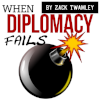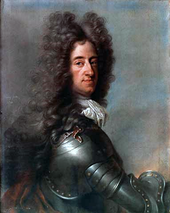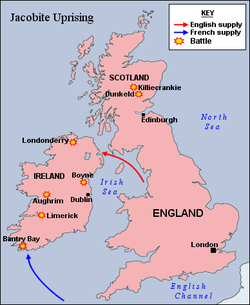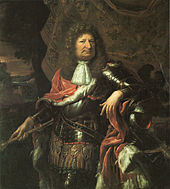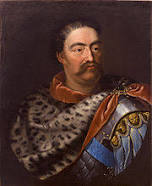It's all Vauban's fault! In fact, Vauban is often the forgotten genius of Louis' era - the man who so insulated France that Louis was able to get away with plunging his realm into so many terrible wars.
PHEW! Welcome back to a new series in WDF's timeline, after a glorious two month break in which I got many an item done, and capped it all off by announcing that WDF is now my part time job - YAY! With that huge bit of news in mind, you may be wondering what's to come next for WDF. Well history reading friend, this is the place to find the answer to such a query, so read on!
After bringing our narrative up to 1679, you'd be justified in thinking that the 17th century had contained and seen enough so far, and that maybe a nice quiet set of decades would do everyone some good. In fact, what Europe and the world got were another two decades of eventful, dramatic and significant action which not only profoundly affected everyone living through the era, but had a great impact on our world. The Long War, episode 30 of our narrative which began officially with WDF 26 and the First Anglo-Dutch War, resumes the 17th century in WDF's narrative series, but what should you be expecting from us this time around? Have a look here and see if anything tickles your fancy in this, 5 Things You Can Expect from the Next Series of WDF
5) More Louis XIV, more terrible faux pas
Louis XIV liked to think of himself as a warrior without equal, but his unnecessarily aggressive tactics made him few friends, several enemies, and five wars in total.
Here at WDF we’ve seen Louis XIV of France make many errors, but also get a few things right. One of the most galling things to come out of the Franco-Dutch War in my view was the fact that Louis never really got any kind of comeuppance for his wanton warmongering and recklessness throughout the war. The 1680s and 90s are pretty much a different story, although we do get to see some pretty impressive French gains from the get go, as our narrative begins with an examination of the War of Reunions, that mini war in between the larger wars. Much like the previous small war, the War of Devolution (1667-68), this one also involves the owning of Spain.
The late 1680s and 90s will be dominated by the events of the War of the Grand Alliance, also known as the War of the League of Augsburg, also known as the Nine Years War. It’s a war of many names, and many events. It is possible to mark its beginning at the Glorious Revolution in 1688 – more on that later – but in reality the war began with Louis overstepping the mark one last time. After getting all he wanted in his diplomatic and pressure campaigns against the Spanish, Louis tried again to use a bombastic diplomacy to get his own way. This time, it was in the bishopric of Munster, where the War of the Cologne Succession was fought.
The Battle of La Hogue in 1692 was the last French effort to gain control of the seas. After this, an Anglo-Dutch supremacy at sea was assured. On land though, it was an altogether different story...
This war of succession, concerning an important strip of land along Louis’ borders, resembled a fundamental failing of his German strategy as much as it did a failure of the European diplomatic system. Louis did not want a war, and he certainly did not want a coalition war the likes of which France had never seen, yet by the late 1680s it was too late to roll back the clock. Louis had spent the last twenty years casting France as the supreme power on the continent, and casting himself as the fearless warlord attempting to aggrandise its borders through threatening means. It’s little wonder that by the time of the late 1680s, using the same tactics he had always resorted to, his neighbours and rivals couldn’t tell the difference between a France that desired war and a France that happened to be using methods that threatened them all.
The War of the League of Augsburg is the official name I’ll be giving it, since I think War of the Grand Alliance sounds a bit dramatic, while the Nine Years War has already been used in the past. Within this war, you can expect to see much high drama, as Louis launches his nation into its greatest military challenge yet, though without any of the allies he had once had to rely upon. Augsburg is thus significant because, for the first time, Louis XIV would stand alone. He would be forced to face a coalition comprised of Spain, Britain, the Dutch, the Holy Roman Emperor’s states, several German states allied to the Emperor, the Duke of Savoy and even Sweden for a time. This war also represented the first time that the so-called maritime powers of England (or Britain from 1707) and the Dutch fought side by side against Louis XIV. From 1688 onwards, the image of Britain as the power that always threw its weight behind the weaker party, and generally against France, looms into view.
The Rhine was arguably the most important front of the war, especially in the minds of Louis' generals, who continued to fear the prospect of German forces spilling across that ancient barrier.
The campaigns across the continent, not to mention the different fronts that the war spilled into, are something to behold, and we’ll do our best to cover it in detail, but you should also note the presence of the Holy Roman Emperor, and thus the Empire, in the coalition. This should strike us as particularly impressive, since during the period the Habsburgs were also locked in a titanic struggle with the Ottoman Empire, in a conflict which began famously, outside the walls of Vienna…
4) An incredible siege, like you've never seen before
Speaking of strong characters and the Siege of Vienna, the Electors of both Bavaria (Max Emmanuel, pictured) and Saxony (John George IV) would play a pivotal role in arming their states and sending these forces to aid the Emperor in 1683.
The siege of Vienna in September 1683 represented one of most striking events of the early modern era. Some would say it was the turning point of that era, where the Ottomans began their long decline, and the West began its ascent. There is some truth to this idea, but as we’ll see, by the time the Turk appeared outside of Vienna in July, there was no indication of the decline which would later befall Constantinople. Far from weak, the Ottomans looked stronger than ever. For Leopold I, Holy Roman Emperor, the threat from the East had always seemed less than the threat from Louis XIV, and he only seems to have realised the true extent of his miscalculation as he and his family fled the city, uncertain whether they would even see it again.
The Siege of Vienna stands in the historical discourse as an event of immense significance, but you wouldn’t know that judging by the way the Habsburgs behaved in the years before it took place. From the moment the war with France ended and the Peace of Nijmegen was signed, the Habsburgs seemed more interested in what Louis was doing than in what that old enemy in the east was up to. Leopold had good reason to be distracted as we’ll see, since France was well on its way to intimidating its neighbours into submission through a series of diplomatic and administrative coups which took all of Europe by surprise – the seizure of Strasburg in September 1681 being a particular highlight.
The last siege of Vienna was the culmination of so many things, from the Habsburg-Ottoman rivalry to the conflict between east and west. I cannot wait to bring to you in all of its (very) gory detail...
Indeed, it’s easy to forget how torn between east and west the Emperor and his court was. We examine all of these details, as well as how diplomacy played a defining role in preparing the West for what was to come. Without the last minute dealings between the Emperor, his key German subjects and of course a certain Polish King, Vienna itself may well have been lost. In fact, as our narrative will show, the city of Vienna came perilously close to falling to the invader. The striking, epic and grisly details of the siege, as well as how exactly the Habsburgs hoped to equip the city for a terrible enemy, are all details I can’t wait to share with you guys. It makes for incredible listening and, I feel, an incredible story as well. You couldn’t make this up – sometimes history really is more epic and incredible than fiction. Speaking of fiction, if you want to whet your appetite for the Siege and discover some of its integral untruths along the way, make sure to check out Our Fake History’s three part special on the Last Siege.
The Peace of Ryswick settled the wars in Europe...until 5 years later when the War of the Spanish Succession broke out. Oh Europe, never change.
3) A Revolution, Glorious in execution...
James II played a key role in the Glorious Revolution of 1688, for all the wrong reasons. The legacy of that event endured throughout the 18th century
William of Orange was a key character in the development of Anglo-Dutch relations into the 18th century, and not just because he was half Dutch and half English. In fact, marrying his cousin Mary just as the Franco-Dutch War came to a close, the triumphant Stadtholder of the Netherlands seemed content to merge himself even further with the English, even though they had waged three wars against his homeland since the date of his birth in 1650. That three Anglo-Dutch wars took place were a fact of the day by 1678, but it was clear also upon the Peace of Nijmegen that times were changing. Somewhere along the way that the English had fought the Dutch in a trilogy of wars of varying degrees of success, they had become more in favour of Dutch ways, Dutch people and, of course, Dutch war leaders.
The Low Countries remained a critical sphere of the wars fought by Louis XIV, not to mention a critical concern of the rest of Europe. Allow France to gain too strong a footing here, and she'd be unstoppable. Yet, just who was prepared to stop her before she marched guns blazing into some random fortresses in Flanders? Coalitions were the only way to oppose what the King of France had in mind.
William of Orange seemed to be the shining beacon of Protestantism by the time the war with France ended in 1678. By contrast, the King of England and Scotland was Charles II, a man of many talents and an admirable disposition for sure, but hardly the religious or political leader that the English were coming to believe they needed. The reason why the trend of pro-Dutch sentiment in England was all the more interesting was because, just as they became more pro-Dutch, the English and Scottish people became more anti-French.
That this anti-French feeling was often tied in with anti-Catholicism is certainly significant for us, as our story addresses what the situation facing the British establishment when, in 1685, Charles II died without an heir. Although the brothers had had their differences, James II was still his designated successor by the time of Charlie’s death. At first, maybe this wouldn’t be so bad. James had two Protestant daughters, and even while his avowed Catholicism was unsettling, the man had never declared any intention to convert England to that old religion. Everything seemed safe enough. That was, of course, until a son was born. Through this new male the Stuarts would continue, yet this new son of James II would undoubtedly be raised a Catholic, something which the thoroughly Protestant British political establishment felt they could not abide by. The feelings were not universal, as we’ll see, but they were certainly strong enough to lead to thoughts about an alternative; an alternative, perhaps, in the half-Dutch half-English war hero, who would stand up for the Protestant religion and challenge Louis XIV in Europe?
The British Isles, another key front of the war, particularly after the events of 1688 and the Williamite Wars that followed.
Another key front in the war, that of the North-West of Italy where the Duke of Savoy fought a losing battle against the French.
That James II had begun to seem worryingly pro-French when it was becoming unfashionable to be so was also disconcerting. What if James led Britain once more into an unfavourable situation with Catholic France? What if Catholic France demanded things of Catholic James that Protestant Britain could not abide by? The situation escalated, and in time, much to the surprise of Europe, Louis XIV and of course James II himself, William answered the question for everyone by landing a large force on the English coast. With the gauntlet laid down, it now remained to see what would happen next. Here at WDF we’ve been long looking forward to covering the events of this showdown, known in history as the Glorious Revolution. It can be seen as the culmination of several different trends – religious concerns, Francophobia and the conflict between King and Parliament – and much like everything else we’ve seen in WDF’s coverage of the period, it involves a healthy dose of high drama, diplomatic mistakes and fascinating characters. Speaking of characters…
2) A World of Strong Characters, who fought strong wars
Frederick William, the Great Elector of Brandenburg. One of many great leaders of the period. His death in 1688 marked the end of 48 year rule which saw Brandenburg-Prussia lifted out of poverty and into the world stage.
There’s just something about national leaders from this era of history that fascinates me. I can’t tell if it’s because of the era in question, because they faced so many challenges, because so much was riding on them or because I loved to see them develop in their own organic way, but one thing I do know is that it really helps when you have not one, but several fascinating great leaders running around. In each of the major states involved in our coverage of the long war, the leaders of each deserve some level of credit for their tenacity, ingenuity or perseverance. I think it’s often rewarding to look at the side we would traditionally consider the ‘bad’ side, so for example, Louis XIV, Kara Mustafa and even James II if you’re feeling especially uncompromising.
What I love to do is look deeper into each of these men’s characters and find out what drove them, what repulsed them and what kept them awake at night. What made Louis so content to repeatedly wage war or at least risk war; why was Kara Mustafa compelled to march the largest Ottoman army yet seen to the gates of Vienna; how did Jan Sobieski manage to mobilise his ailing Commonwealth into giving a performance greatly at odds with its actual practical powers? What did these people have that made their countrymen want to keep fighting in their name? Why were the people of Britain motivated to fight for ‘King William III’, the man they had always known to be a resolute Dutchman? How did James II cope with being banished from his English home for the second time in his life?
Leopold was something of a stalwart of the era. Though he didn't really deserve the 'Great' moniker he's sometimes given, he was an important character of great significance for the developing Franco-Austrian relationship
The population of our story with so many great and interesting men and leaders speaks volumes about how dramatic and entertaining you can expect our series on the Long War to be. Throughout its duration I hope to bring you guys different perspectives on these figures, and I also plan to delve into more detail about how such figures controlled events, or seemed at the mercy of them. There is so much of Europe, of the 17th century, left for us to cover at WDF, so I hope you’re as excited as I am to jump right back into it again!
1) Engagement, expansion and yet more history than ever before!
The siege of Namur in 1692, one of many occasions where French military supremacy was on show
Did you miss that huge announcement where I said that I'd be making this podcast my part time job for the foreseeable future? How amazing is that? In line with what we’ve seen already, WDF is making expansion its order of the day from September. I don’t mean the unsafe expansion which Vauban would have frowned upon, I mean the right kind of expansion, where we move our borders into previously untapped territory while still remaining true to the original WDF formula. How are we going to do this? By giving you guys more history. Something really useful I learned from doing Five Weeks to Run Wild is that you guys really enjoyed the additional bits of that project. You loved when I went out on a limb with a WDF THINKS episode; you loved when I pretended everything was normal in an ALT/HIS special and you loved hearing different perspectives in one of the many COLLABS I did. Well, from September 2017 I’m happy to report that all of these new aspects of WDF are here to stay, what’s more, they’ll be better than ever!
I am always striving for ways to make WDF better. The best way to do that is to find a way to stay true to our formula, to remain entrenched with the episodic formula – in this case the Long War for episode 30 – while still bringing content out that people can enjoy. Maybe you’re waiting until the Long War is finished before you get down to listen to it all. Maybe Louis XIV’s era has just never really been your thing. Maybe, if you’re honest, you’ve got so many freakin’ episodes to catch up on, including my older ones, that you just don’t have time to keep pace with yet another new series. Our little additions to the WDF family are my way of saying ‘that’s ok, but maybe you’ll stop by and listen to this instead?’ Would you stop by to hear me talk with your favourite podcaster? What about delve briefly into a completely unrelated topic? What about imagine a completely different world? WDF is expanding its horizons while still keeping what made it special at the core of what we do. That’s one of the major reasons I’m so excited to begin this new season.
Here the guns of Quebec are painted firing at the British, an illustration of how widespread the War of the League of Augsburg became
I should of course add that what you’re reading right now, the blog, is another important part of this process. For so long the blog had been an occasional side project, something which I liked to do but which I could never make time for. Now, thanks to some preparation, I have found the time, and as a result I’m a fantastic response and great returns from it. There is a surprising amount of value in such mediums, and it is because you continue to read articles just like this one, that I’m able to release a new blog post every Wednesday. It means that, even if you’re bummed that you have to wait another week for an episode, you can at least have yourself a bit of a read. I should add that you’re only allowed to read these articles if you read them in my voice. Otherwise, I mean what’s the point?
Jan Sobieski quite justifiably gets his own unique chance to shine in WDF's XTRA feed. If you're not sure about whether you want to listen in full or not, make sure to check out the first episode, which will be released into the normal feed for all listeners to enjoy!
On a final note, concerning what you could possibly do with yourself if you run out of Zack for the week, I really have to give a shout out to two developments in WDF’s lifecycle that make this new series and new season all the more exciting. Recently I announced that we at WDF are expanding our Patreon experience. What this means is that for $2 a month, you guys can get access to the ad-free and BEFIT free podcast feed a whole week earlier than normal listeners, while for $5 you guys get this, but also an hour of extra content every month. I will, I must admit, be releasing an article in the future on the Patreon page, and why all fans of WDF should be excited, or at least encouraged, by it. But just for yourself right now, why should you care?
Well, if you managed to listen to certain spoilers in the past, you’ll know that in the future, the patrons will be having it really good, to the point that you’ll be literally months ahead of normal listeners and privy to some incredible extra content – everything from a biography of Jan Sobieski in 12 parts, to an examination of 10 Habsburg Emperors to that long awaited Age of Bismarck series. For $5 a month, you can have even more of me in your life, but for $2 a month, you can be sure that you’re always up to date and listening to the most accessible version of this podcast available to you. This is why the $5 feed is called the XTRA feed and the $2 feed is called the AXESS feed; the reason why I never shut up about it, is because I am still amazed about how much you guys have invested in me already. It is because of my supporters on Patreon that I am able to imagine a future where WDF plays a very significant role not just in the lives of my listeners, but also in the general discourse of history. That of course is incredibly exciting, and I can’t thank those that have already supported enough for their confidence and investment in me.
‘But what if I’m not and never intend to be a Patron Zack?’ – know this then, you are awesome too, because you’re part of this: you are part of the WDF family and you are a listener of immense value to me. This is why I am expanding the podcast’s scope; not because I want more Patrons, but because I want to bring you more history. I want to make WDF the place to be for everything history. Something you can enjoy in your listening; read about while on your travels, and maybe engage with online on social media or the like. Thanks to Patreon we can break glass ceilings which used to stop me from doing this as often as I’d like. Thanks to the income I get from it, from your guys' generosity, I was recently able to announce that WDF is now my part time job. That's incredible. Thanks to you, we can make WDF into something incredible: a history podcast like no other, and somewhere where you would be eager and welcome to spend your time.
************
Are you excited for the next step in WDF’s lifecycle? What are you most looking forward to in the Long War? Can you contain yourself or do you swoon at the thought of a Jan Sobieski biography? I really want to hear all of your opinions, and I really hope you know how much you mean to me – even just for reading this, you’ve played an important part in helping WDF grow. Why not take the next step – share this post, share me with your friends or simply tell someone in conversation about us, and you’ll be doing your extra bit to make history thrive! Thanksssss, and remember you can find me on Twitter @wdfpodcast and of course Facebook, email and the website itself.
